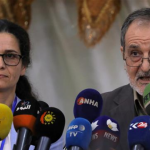By Cengiz Aktar
The European Court of Human Rights (ECHR) recently voted to reject an application on the grounds that the applicant from Turkey had not exhausted domestic legal avenues. Applicants were complaining about human rights violations in December 2015 during 24-hour curfews applied in the city of Cizre, in the Kurdish-majority southeast of Turkey.
This decision comes in the aftermath of the Turkish government’s refusal to implement the ECHR’s ruling that the Turkish government release Selahattin Demirtaş, the leader of the pro-Kurdish Peoples’ Democratic Party (HDP) who has been imprisoned since November 2016, following the government-declared state of emergency in the aftermath of the attempted coup d’état in July that year.
Add to these, the 27,000 applications by people claiming unlawful dismissal from their jobs following the 2016 coup that were rejected by the court and you get a sense of the great disappointment felt in Turkey by those who had long given up seeking justice in Turkish courts, and looked to the Strasbourg court for redress.
But for a long time now, the court has not shown interest in adjudicating rights violations in Turkey, and when it has ruled against the Turkish government, Ankara has refused to comply with the decision.
For instance, the ECHR announced that Turkey’s Constitutional Court (AYM) is continuing to review cases pertaining the Cizre, and that although applicants have argued that the AYM is no longer an effective legal recourse, they have been unsuccessful in proving the argument. How this argument could be proven is literally and utterly inconceivable.
Similarly, the court stated that the 27,000 applications were premature, as domestic legal recourses should have been exhausted before applying to Strasbourg, and that although it is difficult to prove whether legal institutions in Turkey are still effective, time will tell. What more can the tens of thousands of victims do in order to prove that Turkey’s State of Emergency Commission, supposedly established to address grievances resulting from the state of emergency, is a total charade? The ECHR is kicking the can down the road and rejecting responsibility.
Just the other day, applications from 17 lawyers accused of membership of so-called terrorist organisations were rejected, and the applicants were addressed again to the AYM, which has not been reviewing cases for months.
As for Turkey’s failure to comply with the court’s ruling on Demirtaş, it was the Turkish government’s turn to kick the ball into the long grass. Unlike Russia’s response in similar cases, which has been to declare the supremacy of Russian law over the ECHR rulings, Turkey has explicitly avoided admitting that it does not feel beholden to the court rulings.
The fact of the matter is, for people seeking justice in Turkey, applying to the ECHR is becoming increasingly meaningless. Ahval contributor Dr. Eser Karakaş was spot on in his analysis that the ECHR and its underlying convention are not designed to spread democracy to undemocratic countries. Neither the ECHR’s founding documents, nor the convention itself, nor jurisprudence references such a function. The ECHR oversees the rule of law and corrects small divergences, but has no authority nor duty to fix an openly extrajudicial, fascist country like Turkey. This holds true for Russia and many former communist countries as well.
Unfortunately, membership in the Council of Europe or the European Union is not the path to democracy and rule of law for the former Soviet bloc. Since 1989 the vast majority of these countries have joined European institutions, but the inoculation of Europe has proven ineffective.
As one of the founding parties of the convention, Turkey insisted it was an advanced democracy, and could do no wrong when compared to former communist countries. Though it is sad that Turkey has now fallen into this pariah league, it is unsurprising. Just like with the lame ducks in this league, Turkey’s European inoculation has failed.
***
Now let us take a look at the 2018 Annual Report that the ECHR published on Jan. 24.
Since the ECHR’s jurisdiction was accepted in 1989, of the 3,532 rulings the court has made regarding Turkey, 3,128 involved the violation of at least one article of the convention. Turkey is in first place with this impressive performance, far ahead of any competitors. Of the violations, 919 concerned the right to a fair trial, 755 the right to freedom and security, 660 damage to private property rights resulting from the government’s forced nationalisation of private ownerships, and 603 concerned the right to a speedy trial.
Of the 1014 rulings the ECHR made in 2018, 146 were about Turkey. In 140 of the rulings, the court ruled that at least one right had been violated. Four of the cases resulted in verdicts that no rights violations had taken place, and two were settled through arbitration. The articles that were violated most frequently were as follows: the right to a fair trial, 41 times; freedom of speech, 40 times; right to freedom and security, 29 times; right to an effective investigation, 15 times; the right to peaceful assembly, 11 times; inhumane or degrading treatment, 11 times; right to a speedy trial, nine times.
The report uses the Demirtaş case as an example in two instances: in reference to the violation Article 5 of the Convention, which guarantees the right to freedom and security, and in reference to the violation of Protocol 1 of the Convention, which protects the freedom of elections.
Turkey is one of the forerunners in applications the ECHR receives, ranked at number four. The court receives applications from 47 countries that are members of the Council of Europe. Of the 56,350 cases awaiting rulings, 72 percent of the applications concern only six countries. Russia is in first place with 11,750 applications, followed by Romania with 8,500 applications, Ukraine with 7,250 applications and Turkey with 7,107 applications. Bear in mind, there were more than 27,000 rejected applications concerning Turkey as well.
***
Turkey’s rift with the European institutions established after 1945 is growing. EU membership talks have reached a de-facto end, the NATO alliance is shaky, and ties with the Council of Europe are terrible. All of the institutions of the Council of Europe, including the Venice Commission, the Parliamentary Assembly Monitoring Committee, the Human Rights Commissioner, and the ECHR are noting and recording Turkey’s awful trajectory. For example, Turkey still has not been able to find a judge to replace its previously appointed judge, whose term expired two years ago on April 30, 2017.
When Turkey accepted individuals’ right to apply to the court in 1987, and accepted the ECHR’s jurisdiction in 1989, it became a part of the European Convention on Human Rights system. Some say that Turgut Özal, Turkey’s president in 1989, signed the law in question while expressing the belief that Turkey’s broken judicial system could only be fixed by joining the European system and adopting its benchmarks. That is exactly what happened – in spite of everything, our legal system underwent a transformation. Now, the exorbitant increase in rights violations resulting from antidemocratic changes in the country demonstrates that the ECHR relationship is unsustainable. Neither Strasbourg nor Ankara has any expectations from the other.
In the Russian Duma there is open talk of renouncing the Council of Europe and the ECHR. Turkey is not yet at this point, but it does loom on the horizon.
Source: Ahval News



